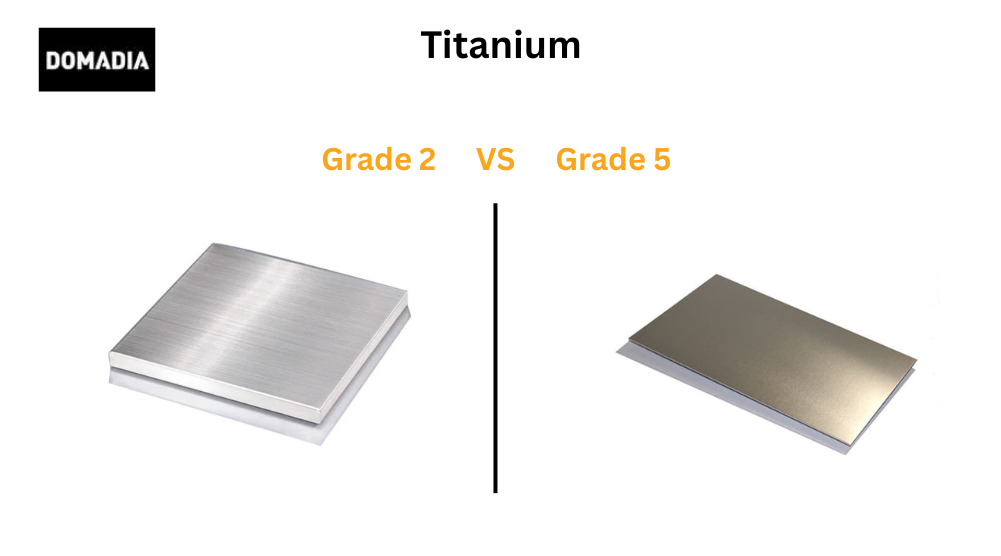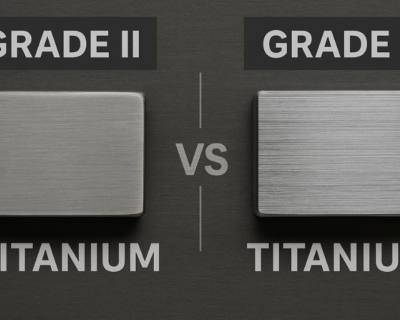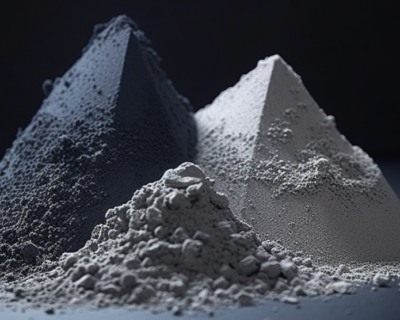Blogs

Titanium Grade 2 vs Grade 5 (UNS R50400 vs R56400): When Strength Meets Simplicity
Which Titanium Grade Should You Bet Your Project On?
Two engineers walk into a meeting room. One wants Titanium Grade 2 for its corrosion resistance and formability. The other swears by Titanium Grade 5 — the aerospace darling with brute strength.
They’re both right. And yet, only one will walk away with the perfect choice.
Welcome to the ultimate face-off: Titanium Grade 2 vs Grade 5 — a tale of purity vs power, of versatility vs victory. If you’re an engineer, designer, or buyer trying to figure out which one wins, keep reading. Because this isn’t just about metal — it’s about making smarter decisions for your project, your cost, and even the planet.
1. The Basics: What Are They Made Of?
At first glance, both are titanium. But beneath the surface, there’s a world of difference.
Grade 2 (UNS R50400) – The “Workhorse” of Pure Titanium
- Composition: Pure titanium with trace elements
- Strength: Moderate
- Superpower: Outstanding corrosion resistance
- Character: Ductile, formable, easy to weld
Grade 5 (UNS R56400 / Ti-6Al-4V) – The Alpha Alloy
- Composition: 6% Aluminum + 4% Vanadium
- Strength: 3x higher than Grade 2
- Superpower: Extreme strength-to-weight ratio
- Character: Hard, high-performance, difficult to machine but unbeatable in demanding scenarios
2. Property Showdown: Who Outperforms Whom?
| Property | Grade 2 | Grade 5 |
| Tensile Strength | ~345 MPa | ~895–930 MPa |
| Yield Strength | ~275 MPa | ~825 MPa |
| Elongation | 20–30% | 10–15% |
| Thermal Conductivity | 16.4 W/m·K | 6.7 W/m·K |
| Electrical Conductivity | ~3% IACS | ~0.6% IACS |
| Weldability | Excellent | Good, needs expertise |
| Density | 4.51 g/cm³ | 4.43 g/cm³ |
| Hardness | Rockwell B 70 | Rockwell C 36 |
| Machinability | Easy | Tricky (due to hardness) |
Go with Grade 2 for chemical stability, easy fabrication, and marine environments.
Choose Grade 5 when you need durability in extreme conditions like aerospace or medical implants.
3. Application Face-Off: Where Do They Rule?
Titanium Grade 2 (R50400) – Champion of Corrosion
- Chemical processing plants
- Bleach production (resistant to wet chlorine)
- Marine hardware & desalination units
- Flue Gas Desulphurisation systems (FGD)
- Heat exchangers
- Medical surgical tools
Think saltwater, acids, industrial fluids — Grade 2 thrives in them.
Titanium Grade 5 (R56400) – The Industrial Athlete
- Jet engines, aircraft structures
- Military defense components
- High-performance automotive parts
- Orthopedic implants, prosthetics
- Sports equipment
When lightweight strength is life-or-death, Grade 5 is your go-to alloy.
4. Cost: Who’s Lighter on the Wallet?
- Grade 2 is less expensive, easier to process and weld.
- Grade 5 is costlier (due to alloying and machining complexity), but its superior performance often justifies the investment in mission-critical applications.
Think Long-Term: While Grade 5 may pinch upfront, it reduces the number of parts needed, enhances lifecycle, and cuts downtime costs — making it economically smarter in the long run.
5. Environmental Consideration: Which Grade Is Greener?
✅ Grade 2: Easier to recycle, but may need more frequent replacement.
✅ Grade 5: Lasts longer, reducing the frequency of scrapping and reprocessing.
♻️ Sustainability Insight: Fewer replacements = less environmental impact. Grade 5’s long life contributes to lower carbon footprints in high-load applications.
6. Standards & Specifications
| Property | Grade 2 | Grade 5 |
| UNS Number | R50400 | R56400 |
| ASTM Spec | B348, B265, B861, B337 | B348, B265, F136 (medical) |
| Form Available | Sheets, Plates, Bars, Tubes | Sheets, Plates, Bars, Forgings |
✅ 7. When to Use What? – A Quick Decision Guide
| Requirement | Choose Grade 2 | Choose Grade 5 |
| Corrosion Resistance | ✅ | ✅ |
| High Strength | ❌ | ✅✅✅ |
| Weldability | ✅✅✅ | ✅ (needs skill) |
| Cost Efficiency | ✅✅✅ | ❌ |
| High Temp Use | Moderate | ✅✅✅ |
| Machinability | ✅✅✅ | ❌ |
| Marine / Chemical | ✅✅✅ | ✅ |
| Aerospace / Medical | ❌ | ✅✅✅ |
Conclusion: Don’t Just Pick a Metal. Pick a Mindset.
Titanium Grade 2 and Grade 5 are not rivals — they’re specialists.
Choose Grade 2 when your needs are corrosion-first, cost-conscious, and process-friendly.
Opt for Grade 5 when you’re pushing the limits — high stress, high stakes, and no compromise on performance.
💡 The best engineers don’t just choose the strongest material. They choose the right material — one that aligns with the application, the budget, and the future.
Reach out to Domadia’s team for recommendations or any sort of help.
Visit our website: Domadia.com
Email: sales@domadia.com
Call/WhatsApp: +91-9594066275
Follow us on LinkedIn: https://www.linkedin.com/in/kairav
Talk to: Er.Pankaj Domadia | Kairav Domadia | Aadil Domadia | Pragati Sanap | Pooja N N | Shivani Kanojia




